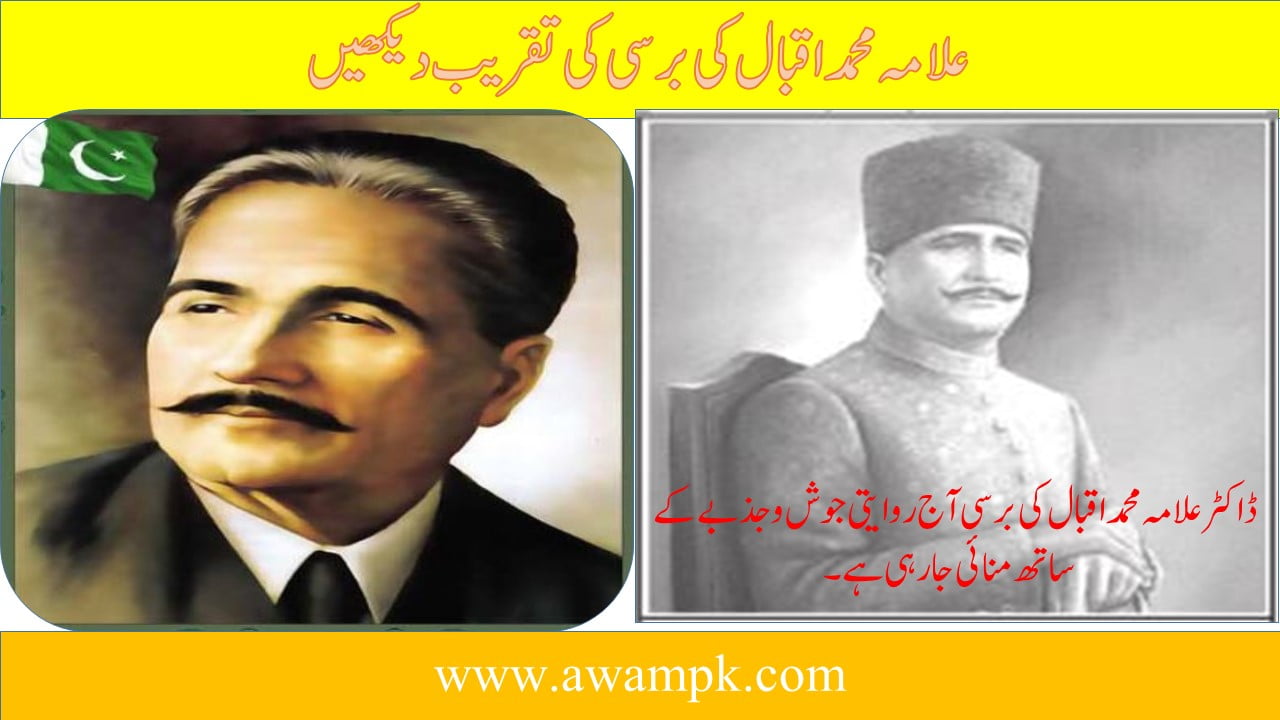The 85th death anniversary of Dr. Sir Allama Muhammad Iqbal, the poet and thinker of Pakistan, will be celebrated today. In connection with the death anniversary, events will be organized across the country, including Sialkot, at official and non-official levels, in which homage will be paid to the great services of Hakeem Ummat Dr. Allama Iqbal for the movement of Pakistan. Newspapers will publish special editions while PTV, private TV channels will also broadcast special programs. Allama Iqbal, the poet of the East, was a prominent jurist and an important personality of the Pakistan Movement and a prominent poet of Urdu and Persian. Allama Iqbal is considered as Sufi poet of modern era.
Allama Iqbal’s 86th death anniversary on 21st April 2024
Allama Iqbal’s 85th death anniversary on 21st April 2023, Various Functions have been organized to pay tribute to the poet, who through his ideas and poetry played a significant role in motivating and mobilizing the Muslims of the subcontinent to create a separate homeland. He completed his primary education in Sialkot, matriculated from Mission High School and passed FA examination from Murray College Sialkot. After that Allama Iqbal did his Masters, in Philosophy from Government College Lahore and then went to England for higher studies After graduating, he moved to Germany, where he earned a Ph.D. in philosophy from the University of Munich. He also taught at Oriental College but took up law as a permanent profession.
Allama Muhammad Iqbal 86th death anniversary
The 85th death anniversary of poet and philosopher Dr. Allama Muhammad Iqbal is being observed today. Allama Muhammad Iqbal was born in Sialkot on November 9, 1877. He additionally recognized as a national writer, and called Muffakir-e-Pakistan, Shair-e-Mashriq, and Hakeemul Ummat and is attributable to sparking the pan-Islamic thought among Muslims of the landmass.
Muhammad Iqbal known as Allama Iqbal was a poet, philosopher, and politician, as well as an academic, barrister, and scholar in British India who is widely regarded as having inspired the Pakistan Movement. He is called the “Spiritual Father of Pakistan.” He is considered one of the most important figures in Urdu literature with literary work in both Urdu and Persian.
The Shair-e-Mashriq is considered to be one of the most important figures in South Asian literature, with works in both Urdu and Persian. He is additionally thought of as one of the foremost necessary figures in literature with literary works in each Urdu and Persian language. Asrar-e-Khudi, Payam-i-Mashriq, Bang-i-Dara, Bal-i-Jibril, Zarb-i Kalim, and Armughan-e-Hijaz were amongst his best works. An advocate of Muslim rights, championing his ideas with pen and revolutionary concepts, Iqbal’s word, and work is still quite relevant in the present day. 145th years ago birthday anniversary of allama dr.sir Muhammad Iqbal (9th November 1877 to 21st April 1938).
Iqbal is admired as a prominent poet by Indians, Pakistanis, Iranians, and other international scholars of literature. Though Iqbal is best known as an eminent poet, he is also a highly acclaimed “Muslim philosophical thinker of modern times”.
His first poetry book, The Secrets of the Self, appeared in the Persian language in 1915, and other books of poetry include The Secrets of Selflessness, Message from the East, and Persian Psalms. Amongst these, his best-known Urdu works are The Call of the Marching Bell, Gabriel’s Wing, The Rod of Moses, and a part of Gift from Hijaz.
Along with his Urdu and Persian poetry, his Urdu and English lectures and letters have been very influential in cultural, social, religious, and political disputes. Some of his best works comprise Asrar-e-Khudi, Payam-i-Mashriq, Bang-i-Dara, Bal-i-Jibril, Zarb-i Kalim, and Armughan-e-Hijaz.
In 1923, he was knighted by King George V, granting him the title “Sir”. While studying law and philosophy in England, Iqbal became a member of the London branch of the All-India Muslim League. Later, during the League’s December 1930 session, he delivered his most famous presidential speech known as the Allahabad Address in which he pushed for the creation of a Muslim state in northwest India.
Various social, political, and cultural organizations can hold special programs to pay court to the writer. He kicked the bucket in Lahore on April twenty-one, 1938.
In much of South Asia and the Urdu-speaking world, Iqbal is regarded as the Shair-e-Mashriq (Urdu: شاعر مشرق, “Poet of the East”). He is also called Mufakkir-e-Pakistan (Urdu: مفکر پاکستان, “The Thinker of Pakistan”), Munawar-e-Pakistan (Urdu: مصور پاکستان, “Artist of Pakistan”) and Hakeem-ul-Ummat (Urdu: حکیم الامت, “The Sage of the Ummah”). The Pakistan government officially named him “National Poet of Pakistan”. His birthday Yōm-e Welādat-e Muḥammad Iqbāl (Urdu: یوم ولادت محمد اقبال), or Iqbal Day, is a public holiday in Pakistan.
Dayar-e-Ishq Mein Apna Muqam Paida Kar
Naya Zamana Naye Subh-o-Sham Paida Kar
The 85th death anniversary of Allama Muhammad Iqbal, the poet of the East, is being celebrated today, and tributes were paid to him in special events organized across the country. Allama Iqbal is the person who not only presented the concept of Pakistan, but intellectually brought the Qalash nation to that height with his high-harmony poetry, which, under the passionate leadership of Quaid-e-Azam Muhammad Ali Jinnah, became a crucible in the furnace of action of the world. Changed the map.
Iqbal’s house is still located in Sialkot and is recognized as Iqbal’s Manzil and is open for visitors. His other house where he lived most of his life and died is in Lahore, named Javed Manzil.( “Javed Manzil”. The museum is located on Allama Iqbal Road near Lahore Railway Station, Punjab, Pakistan. It was protected under the Punjab Antiquities Act of 1975 and declared a Pakistani national monument in 1977. Allama Iqbal was not only a poet but also a jurist, politician, thinker and an influential writer.
 AWAM PK – Current Jobs & News for Awam of Pakistan AWAM PK Latest News, Results, Jobs, Sports, images, All Prices in Pakistan
AWAM PK – Current Jobs & News for Awam of Pakistan AWAM PK Latest News, Results, Jobs, Sports, images, All Prices in Pakistan



